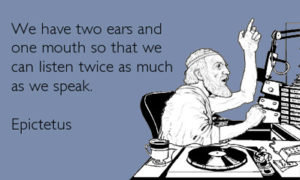Pro Tip: Want to be better? Trust Your Inner DJ (and Listen Better)
 Time is our most valuable asset and the world is noisier than ever. As such, we devote less time to really listen which leads to compromised results. Whether that’s bringing home the wrong flavor of ice cream (“I asked for strawberry!”), an inaccurate product/feature deliverable, or simply a less compelling response to a question (which can cost you a job or promotion).
Time is our most valuable asset and the world is noisier than ever. As such, we devote less time to really listen which leads to compromised results. Whether that’s bringing home the wrong flavor of ice cream (“I asked for strawberry!”), an inaccurate product/feature deliverable, or simply a less compelling response to a question (which can cost you a job or promotion).
Listening — really hearing, builds/strengthens relationships and solves problems. Personally and professionally.
Here are my “Top 5” tips:
Tip #1. Stop Anticipating and Trust Your Inner DJ
We tend to instinctually think that anticipating the next comment or question will better prepare us to give a better response. As such, while your conscious mind is listing to what’s being said, it’s also “digging through the crates” for what great answer/example/story you can give – the problem is, that means you’re not paying as much attention, potentially compromising your response.
You don’t need to prep, you’re sharp. Just listen to the question/comment with full attention and “trust your inner DJ” (your subconscious) to pull the right album.. ahem, answer. You’ll nail it.
Tip #2. Be Focused
Listen with genuine interest and intent to learn. Listen not just for words but also for tone, pace, mood, etc. Observe expression through the eyes, mouth, and shoulders. Don’t get distracted by your feelings on the statement. Screen out distractions like background activity and/or the speaker’s gestures, accent, speech impediments, etc. Focus, focus, “squirrel!” — refocus.
Tip #3. Listen with Your Face
Needless to say, don’t be looking at your phone/screen but looking down can be just as bad. Face the speaker, look them in the eye (even if they don’t look back), smile, nod (but not too much!), look surprised, etc. Be confident, comfortable (but sit up!), and most of all.. interested. Visual disinterest, shyness, and/or uncertainty = #fail
Step 4: Validate and Ask Questions
Don’t interrupt or try to finish the speaker’s sentences! Confirm you are listening, that you understand and that you care by expressing (as mentioned above) through a smile, nod, “yeah”, “exactly”, “nooo”, “really?!”. Then, once the statement is completely made, ask questions. Not for the sake of asking but with genuine curiosity. Sometimes the questions alone can lead to an interesting place.
Timing is everything, though. Make sure the question is relevant or it will send a message of disinterest or derail and lead things in an awkward direction. Make sure to think through what and how you ask. It’s fine to pause and take time to think it through. I like to use facial expressions to show a question is being composed.
Step 5: Don’t be a Hero — Don’t Try to Solve Everything
The quicker a thinker you are, the harder this will be but let the speaker express their thought completely and feel heard. Let them feel you empathize (feel me?). Then, and only after the topic/story is completely expressed, it’s not inappropriate to share a story or idea of a technique/product that it would be valuable – but do it tactfully -AND ONLY if you feel it would be appreciated. Read the room.























